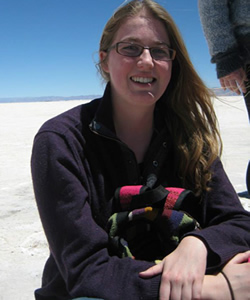“Que linda su rosaria!” (What a beautiful rosary) I commented at a break in the conversation, gesturing at the metal beads around her neck. “Ay, sos catolica?” (Oh, are you Catholic?) she asked, and when I indicated that I was, I could all but feel tension release from the conversation.
“You know, the Pope is from Argentina?!” she informed me, giddy with excitement, and drawing her hands to her chest, “He’s one of suss!”
I indicated that I knew, and we continued to chat about the Pope, Argentina, her neighborhood; about the new shelter she was hoping to receive, until she said something that really resonated with me:
“In this place,” she sighed, gesturing out the window at the neighborhood behind her, “there is either all of the room here for God, or none of it. It depends on how you look at it. I like to believe, maybe, that there is all of the room…”
This semester, I have had the immense privilege to work for A Roof for My Country (Un Techo Para Mi Pais, TECHO), a non-profit, community development organization that builds emergency housing in the slums of Argentina. My time here has pushed me out of my comfort zone, in every sense of the phrase. One facet of our team’s work is deteccion, in which we go into the villas miserias (“misery villages,” Argentine slums) and conduct home visits of families who wish to receive emergency housing. It often involves coming face-to-face with unthinkable poverty, and a reality so far removed from my own that at times it is difficult to conceive.
Although TECHO is an explicitly secular organization, when dealing with such raw human condition there is simply no such thing as absolutes. Whether it is a mother of nine children issuing a simple “God Bless You” upon seeing her new house, or a framed photo of Pope Francis in a house that otherwise has no glass, or seeing a son roll his eyes and shake his head as his father crosses himself, questions of faith come up all the time and add an entirely new dimension to the issues at hand.
Coming to Argentina just months after the naming of Pope Francis, I was curious to observe the landscape of Catholicism here. Nicknamed “the slum Pope” by media outlets, Pope Francis is famous for his involvement in Argentina’s most marginalized communities, often providing generous funding to priests and bishops working in the villas, and taking the public bus out to provide support himself. From his initial installment, I was fascinated by Pope Francis; however, after witnessing first hand the sharp social dichotomies of Argentina, I have gained an entirely different context for who our current Pope is, and what he represents.
The Catholic Church today is at a crossroads, and it seems all too fitting that the Pope’s home country represents some of the most difficult and pressing questions of our time. Questions such as: what is the place of the church in a country with an estimated 11 million people living in poverty? In a place where children go hungry by the hundreds of thousands, and devastating drug use wreaks havoc in the streets? Where is there room for faith, for God, for the Catholic church, in all of this chaos? What does it mean to have a faith that also does justice; and what does that look like in Argentina, and around the world?
Pope Francis, with his promises to work for a “church for the poor,” is a beacon of hope to many of the poor and marginalized in Argentina, who finally feel that in some small way, they have a voice. That maybe, amongst the harsh realities of our world, there is at least a little bit of room, for something.

